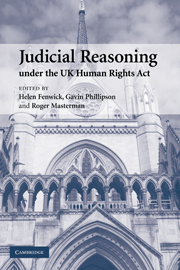Book contents
- Frontmatter
- Contents
- List of contributors
- Foreword
- Preface and acknowledgments
- Table of cases
- Table of legislation
- Table of treaties
- 1 The Human Rights Act in contemporary context
- PART I The interpretation of the Human Rights Act 1998
- 2 The European Convention on Human Rights and the Human Rights Act: the view from the outside
- 3 Aspiration or foundation? The status of the Strasbourg jurisprudence and the ‘Convention rights’ in domestic law
- 4 Institutional roles and meanings of ‘compatibility’ under the Human Rights Act 1998
- 5 Choosing between sections 3 and 4 of the Human Rights Act 1998: judicial reasoning after Ghaidan v. Mendoza
- 6 Clarity postponed: horizontal effect after Campbell
- 7 The standard of judicial review after the Human Rights Act
- 8 Principles of deference under the Human Rights Act
- PART II The Human Rights Act and substantive law
- Index
4 - Institutional roles and meanings of ‘compatibility’ under the Human Rights Act 1998
Published online by Cambridge University Press: 30 October 2009
- Frontmatter
- Contents
- List of contributors
- Foreword
- Preface and acknowledgments
- Table of cases
- Table of legislation
- Table of treaties
- 1 The Human Rights Act in contemporary context
- PART I The interpretation of the Human Rights Act 1998
- 2 The European Convention on Human Rights and the Human Rights Act: the view from the outside
- 3 Aspiration or foundation? The status of the Strasbourg jurisprudence and the ‘Convention rights’ in domestic law
- 4 Institutional roles and meanings of ‘compatibility’ under the Human Rights Act 1998
- 5 Choosing between sections 3 and 4 of the Human Rights Act 1998: judicial reasoning after Ghaidan v. Mendoza
- 6 Clarity postponed: horizontal effect after Campbell
- 7 The standard of judicial review after the Human Rights Act
- 8 Principles of deference under the Human Rights Act
- PART II The Human Rights Act and substantive law
- Index
Summary
The purpose of this paper
In a previous comment on s.3 of the Human Rights Act 1998, I wrote:
we cannot now assume that there is a single ‘right answer’ to the question, ‘What does a provision in legislation mean?’ Instead, there is a range of possible answers, and only those which are not incompatible with Convention rights may normally be adopted. This recognizes the indeterminate nature of language in a more explicit way than has usually been the case, except in relation to EU law.
In fact, this is a problem encountered in all interpretation, but s.3 requires us to confront it openly, instead of dealing with it in silence, or pretending that there is usually a right answer to the question, ‘What does legislation mean?’ This paper starts from two propositions. First, we have to assume that legislation produces effects in the world. Were that not so, it would have merely symbolic significance. Secondly, interpreters must focus on the effects achieved, rather than on the meanings of words.
In this paper, I offer a typology of the different ways in which a reading or effect of legislation may be compatible or incompatible with a Convention right, and develop an institutional analysis of the manner in which interpreters adopt a reading of legislation, arguing that their institutional positions inevitably affect their approach to the twin processes of reading and giving effect to legislation.
- Type
- Chapter
- Information
- Judicial Reasoning under the UK Human Rights Act , pp. 87 - 113Publisher: Cambridge University PressPrint publication year: 2007
- 1
- Cited by



